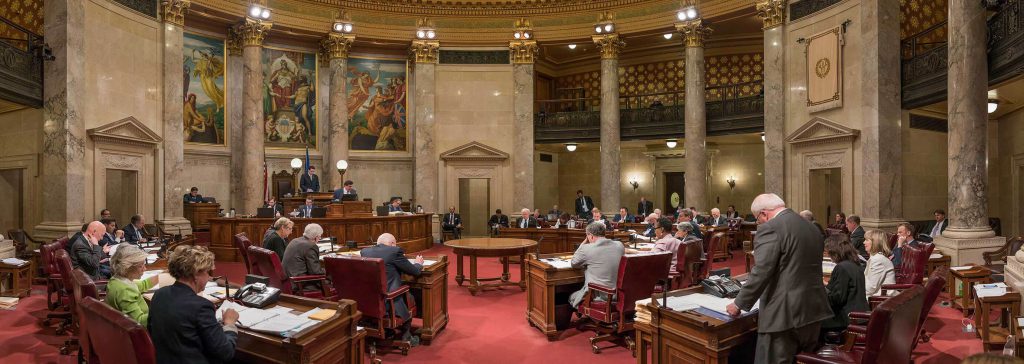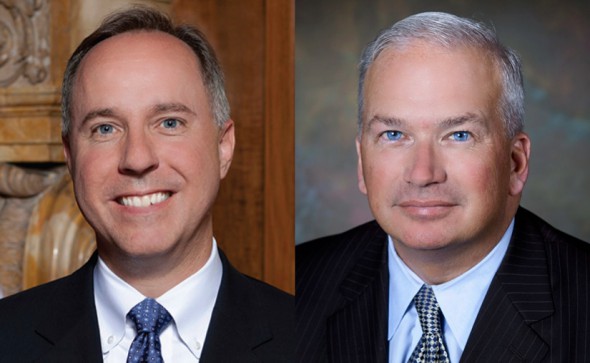What Polls Show About the Legislature
Voters have net positive view of Legislature but negative toward Vos, split on Fitzgerald.
In the three Marquette Law School polls this year in January, April and August, Wisconsin voters responded to questions about the two Republican legislative leaders–Senate Majority Leader Scott Fitzgerald and Assembly Speaker Robin Vos–as well as questions on Gov. Tony Evers.
The August results were what you might expect from a public that often doesn’t follow state politics. Here is our synopsis of the answers on the August poll, unveiled Sept. 4:
Both state Majority Leader Scott Fitzgerald and Assembly Speaker Robin Vos scored low on both positive and negative opinions.
- Vos had 15% favorable and 20% unfavorable with 65% not having an opinion — and he has been in the legislature since 2004.
- Fitzgerald had 19% favorable and 20% unfavorable with 61% of respondents having no opinion; he was first elected in 1994.
It’s not surprising to see state politicians with low name recognition, that’s common. (In fact more than a fifth of the voters don’t have an opinion about Evers even though he’s won four statewide general elections.)
So to find out more about who is paying attention to state politicians, Wisconsin Examiner asked poll director Charles Franklin for a more detailed drill-down into who knows what about these leaders. Franklin, along with his colleague, Lubar Center for Public Policy Research and Civic Education Research Fellow John Johnson, kindly obliged.
To get a more accurate picture, Johnson combined the results of all three 2019 polls. Franklin notes that results across the three polls have not changed much. (Results about Gov. Tony Evers show more people now have an opinion on him than when he first took office in January.)
Johnson found that Fitzgerald–who is now running for Congress to replace Jim Sensenbrenner–is more well known than Vos with 57% lacking an opinion on Fitzgerald, while 67% don’t know enough about the Speaker to comment. And more Democrats (38%) have an opinion about Vos than Republicans (30%).
“Looking around the state, I notice that Vos and Fitzgerald have very similar levels of unfavorable sentiment in each region,” says Johnson. “It’s just that Fitzgerald has higher favorable ratings nearly everywhere. I think this points to his overall higher name recognition–particularly among Republicans who are inclined to view him favorably if they know something about him.”
Looking at compiled “net favorability ratings” among those who do know the two is more interesting — and a sign of how partisan things have become. (Net favorability is the difference between the percent who view a figure favorably and those who view that person unfavorably. Net ratings avoid confusing the numbers with all those people who lack an opinion, explains Johnson.)
Count the Dems as detractors of the Republican Speaker Vos–they give him a net favorability rating of -28, while the Republicans who know him say he’s a +20. Among independents, the 31% who know enough to comment give him a net rating of -7.
Possibly by virtue of being in the Senate seat and having served in state government for an extra decade, Fitzgerald is better known. The 46% of Republicans who have an opinion on him rate him +32, far higher than Vos’ +20 among GOP voters. Fitzgerald is known to 41% of Democrats and disliked just a tiny bit more than Vos by them with a -29. Fitzgerald also does better among independents with a net score of -1.
The one number that surprised even veteran pollster Franklin was how many people were positive about the Legislature as a whole and only 13% said they didn’t know enough to comment. Among the rest, the legislature scores +16. It soars to +55 among Republicans and dives to -14 among Democrats. But, notes Johnson, here is where there is a bit less partisanship: “17% of Republicans disapprove of the legislature, and 37% of Democrats approve of it.”
State Sen. Jon Erpenbach (D-West Point) has a theory about that: “If anything, I think what it might say is that people are looking for balance in government.”
Are you paying attention?
A key subgroup of Wisconsinites who were interviewed emerged from this question:
“Some people seem to follow what’s going on in politics most of the time, whether there’s an election going on or not. Others aren’t that interested. Would you say you follow what’s going on in politics, most of the time, some of the time, only now and then or hardly at all?
And for the Legislature as a whole? “Democrats are more likely to approve of the Legislature if they don’t pay attention to politics most of the time,” notes Johnson. “Democrats who pay a lot of attention to politics give the Legislature a rating of -31 while Democrats who don’t pay so much attention give it a +17.”
Among Republicans and Independents the trend was different. Those who said they don’t pay much attention mostly gave “don’t know” responses.
One more observation from Johnson tied with party affiliation: “I think it’s worth noting that our recent polling finds Republicans to be slightly more engaged with politics than Democrats. This isn’t exactly surprising, as it fits with the long-term trend of about 3% more Republicans than Democrats saying they follow politics ‘most of the time.’ But it does indicate that statewide Democrats aren’t unusually engaged with politics relative to Republicans at this point.”
Evers v the Legislature
Show this fact to anyone who says Wisconsinites are strictly divided GOP red or Dem blue: “Among all registered voters, 19% approve of both Evers and the Legislature; 7% disapprove of both,” says Johnson.
Evers is, logically, much more well known, however he’s still known less than the Legislature as a whole. “Across all three 2019 polls just 21% of Republicans, 16% of Democrats and 25% of independents have lacked an opinion on his job performance. Evers got a net rating of:
- -47 from Republicans
- +78 from Democrats
- +16 from independents
Compare that to President Donald Trump’s net rating of:
- +78 among Republicans
- -90 among Democrats
- -9 among independents in Wisconsin.
Where are you from?
A final area of interest on the political figures is approval by region. No shocker here—Vos and Fitzgerald and the legislature as a whole get net unfavorables in Madison and the city of Milwaukee. Also not a surprise—in the Milwaukee suburbs Vos and Fitzgerald get net favorables. Fitzgerald, according to Johnson’s analysis, can also brag about net favorable ratings in the Green Bay/Appleton area. The governor bests them both, however, in favorables statewide.
“Evers’ popularity is quite widespread,” says Johnson. “His job approval is positive in all regions of the state–although it is quite close in the Milwaukee suburbs.”
But he adds this caveat: about a fifth to a quarter of registered voters in every region still don’t offer an opinion about him, even though he’s run statewide for years as superintendent of education.
“The Legislature as a whole is also above water everywhere…except the city of Milwaukee and the Madison region.”
And if these numbers have not scrambled your political nerd cortex, with a tip of the hat to Lubar Center’s John Johnson, you can find more on the tables and numbers here.
Reprinted with permission of Wisconsin Examiner.
If you think stories like this are important, become a member of Urban Milwaukee and help support real, independent journalism. Plus you get some cool added benefits.
























Fitzy’s eyes are magical leading to slightly less unfavorable ratings compared to Vos. That small, annoying tuft of hair on top of Vos’s head doesn’t help either.